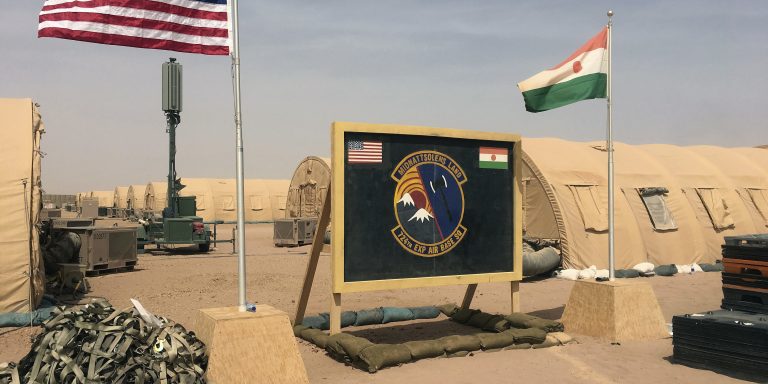INTELBRIEF
April 25, 2024
IntelBrief: U.S. Troops Preparing to Withdraw from Niger in Major Blow to Counterterrorism Efforts in the Sahel

Bottom Line Up Front
- The United States will withdraw 1,000 troops from Niger in a major blow to U.S. counterterrorism efforts in the Sahel, a vast semiarid region of western and north-central Africa where jihadist groups linked to al-Qaeda and Islamic State predominate.
- The withdrawal of U.S. troops from Niger is yet another opportunity for Russia to expand its influence throughout the Sahel, which Moscow plans to do by deploying elements of the rebranded Wagner Group — now referred to as the Africa Corps — to the region to assist junta-led regimes with military training.
- Both the al-Qaeda-affiliated Jama’at Nasr al-Islam wal Muslimin (JNIM) and Islamic State Sahel Province (ISSP), Islamic State’s local affiliate, have been growing in strength and reach over the past year, and now control large swaths of territory stretching throughout the region.
- In September, the juntas in Mali, Burkina Faso, and Niger signed a new defense treaty to ensure mutual assistance among the three governments in case of “rebellion” or “foreign aggression.”
The United States will withdraw 1,000 troops from Niger in a major blow to U.S. counterterrorism efforts in the Sahel, a vast semiarid region of western and north-central Africa where jihadist groups linked to al-Qaeda and Islamic State predominate. The military junta in Niger, which took control over the country in July 2023 following a coup that ousted democratically elected President Mohamed Bazoum, has turned away from the West and toward Russia. There have also been recent discussions about a possible deal with Iran to provide Tehran with access to Niger’s vast reserves of uranium. Until recently, U.S. officials had sought to maintain a limited working relationship on security issues with Niger’s putschist government. Niger has been a critical hub for U.S. military operations in the region, which has been plagued by growing Islamist insurgencies in recent years. Niger hosts two American bases, including Air Base 201, which was the U.S. Air Force’s largest ever construction project, costing 110 million dollars. Despite intensive diplomatic efforts, the U.S. now appears poised to lose access to this costly foothold in the region, as the relationship with Niamey appears to be beyond repair.
Thousands of protesters took to the streets recently in Niger’s capital, Niamey, waving Russian flags and demanding the immediate withdrawal of U.S. troops. The protest looked similar to what happened in other Sahelian countries, including Mali, where Russian influence has spread and afforded more opportunities for the Africa Corps, the rebranded Wagner Group mercenaries deployed to various countries throughout sub-Saharan Africa. Russian trainers arrived in Niger in mid-April to help train the junta’s military forces and solidify security cooperation arrangements between Moscow and Niamey. Last summer’s coup, along with the presence of Russian trainers, makes it exceedingly difficult for the U.S. to maintain its security partnership with Niger.
Both the al-Qaeda-affiliated Jama'at Nasr al-Islam wal Muslimin (JNIM) and Islamic State Sahel Province (ISSP), Islamic State’s local affiliate, have been growing in strength and reach over the past year, and now control large swaths of territory stretching throughout the region. ISSP has recruited a sizable cadre of new fighters and has set its sights on shifting focus to governance in some of the areas where it retains operational control. If this trend continues, or is exacerbated, it will further entrench the group, making the terrorists nearly impossible to uproot. If ISSP’s governance proves more attractive than what junta leaders in the region can offer — a reasonable proposition — it will pose a major challenge with no easy solution. There is growing concern that over time and with enough resources, an Islamic State branch in sub-Saharan Africa could look to establish a mini caliphate, drawing fighters from elsewhere in Africa and perhaps even from further afield. ISSP has engaged in on-again, off-again battles with JNIM, a dynamic that could lead to a process of outbidding, where each group attempts to conduct spectacular attacks to gain the upper hand. After ISSP offensives succeeded in dislocating JNIM militants from towns and villages in Mali, JNIM has looked to expand its influence within coastal West Africa, ramping up attacks in Côte d'Ivoire, Benin, Togo, and Ghana.
In September, the juntas in Mali, Burkina Faso, and Niger signed a new defense treaty known as the Alliance of Sahel States, to ensure mutual assistance among the three governments in case of “rebellion” or “foreign aggression.” The U.S. is attempting to juxtapose its withdrawal with that of the French, portraying it in a different light, without the baggage of France’s colonial history in the Sahel. Nevertheless, without a U.S. presence, the remaining European Union presence will inevitably disappear as well. The situation in Niger reflects a broader trend throughout the region and recently there have been discussions with Chad about the U.S. Status of Forces Agreement (SOFA), which Chadian officials have threatened to cancel. With U.S. troops withdrawing, there are serious questions about what will happen to the $110 million installation in Niger. Without a drone base in Niger, the U.S. has been looking to countries in West Africa, including Ghana, to see if there is an opportunity to relocate. With a more robust Russian presence in the Sahel, most expect terrorist groups like JNIM and ISSP to be the primary beneficiaries, stoking tensions and creating grievances that drive locals to join the ranks of violent extremist organizations.